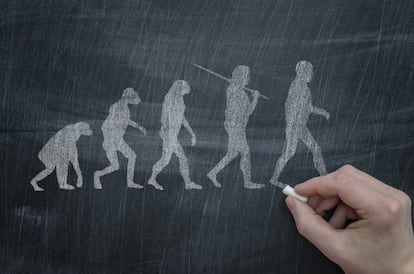A scientific approach to mysticism
There are neuroscientists who care little or nothing about the big questions, and also farmers who are tortured by them

Our mind loves dichotomies. There are left-wing and right-wing people, authoritarians and liberals, believers and skeptics. All of these divisions are debatable, and we will always have to take into account the diffuse, intermediate and epicene cases, but dividing things into two groups, even if it is just an approximation, is a great help to explore the endless subtleties of the reality that is out there. I do not think this is mere human extravagance, because much of the artificial intelligence that we are dealing with these days is based on the art of separating a chaotic arrangement of things into two groups. No matter how messy the objects seem, the machine always finds a simple curve that divides them into two. Maybe formulating dichotomies is a universal way of thinking, one that we could share with aliens and even with a Terminator, an artificial intelligence from the future. Bad or good. Obtuse or broadminded. Trick or treat.
A very curious dichotomy is the one between mystics and pragmatists. I say “curious” because, first of all, I consider myself both. When I go out of the city I look at the night sky and my mind wanders to galaxies and the depths of time. Then I go back and take the subway like everyone else. That’s the thing about dichotomies. Maybe we are all mystics and pragmatists at the same time, but I suspect that some people are much more mystical than others. I am not talking about religion, but about that kind of metaphysical vertigo that captures many people, regardless of their education and beliefs. The mystics ask themselves with Kant: What can I know? What should I do? What can I expect? What is the human being? I know philosophers and neuroscientists who care little or nothing about these big questions, and also farmers who are tortured by them. We are a complicated species.
The U.S. National Center for Science Education, a nonprofit dedicated to promoting the teaching of evolution in public schools, has just named as its executive director Amanda Townley, a woman who grew up in northern Alabama surrounded by the thick atmosphere of young Earth creationism, which holds that God created the world 6,000 years ago. Her high school biology teacher refused to teach evolution; she did not believe in it. It seems paradoxical at first glance, but it is not. Townley was a mystic, like me, and if her teacher was not able to relieve her anxiety about the origins of humanity, she would have to look for answers somewhere else. She immediately decided to read the part of the book that was not on the curriculum and found the truth in Darwin. She studied evolutionary biology and scientific pedagogy, and reached the important position that she occupies today. Her ideas are clear, and she knows better than anyone the dark irrational magma that she must face.
Perhaps we mystics are the most pragmatic after all, because it is true that we live tortured by the big questions, but we are the only ones who think they have answers. Being a provincial person is a poor excuse for believing in strange and harmful things. Read the part of the book that you didn’t get to.
Sign up for our weekly newsletter to get more English-language news coverage from EL PAÍS USA Edition
Tu suscripción se está usando en otro dispositivo
¿Quieres añadir otro usuario a tu suscripción?
Si continúas leyendo en este dispositivo, no se podrá leer en el otro.
FlechaTu suscripción se está usando en otro dispositivo y solo puedes acceder a EL PAÍS desde un dispositivo a la vez.
Si quieres compartir tu cuenta, cambia tu suscripción a la modalidad Premium, así podrás añadir otro usuario. Cada uno accederá con su propia cuenta de email, lo que os permitirá personalizar vuestra experiencia en EL PAÍS.
¿Tienes una suscripción de empresa? Accede aquí para contratar más cuentas.
En el caso de no saber quién está usando tu cuenta, te recomendamos cambiar tu contraseña aquí.
Si decides continuar compartiendo tu cuenta, este mensaje se mostrará en tu dispositivo y en el de la otra persona que está usando tu cuenta de forma indefinida, afectando a tu experiencia de lectura. Puedes consultar aquí los términos y condiciones de la suscripción digital.









































